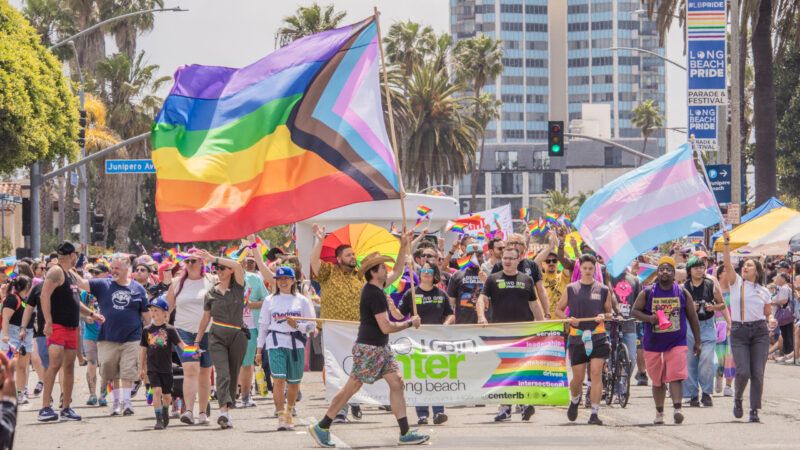Pride Is a Triumph of the First Amendment
Free speech, assembly, and protest—not government action—have powered LGBTQ+ progress in America.

Each June, Pride Month turns our public spaces into sites of celebration and remembrance. But Pride is not just a cultural event; it is a constitutional exercise. At its core, Pride embodies the freedoms guaranteed by the First Amendment: speech, assembly, press, and petition.
Expressive acts of defiance wrote the history of LGBTQ+ rights in America. The Stonewall uprising of 1969 stands as a defining moment for expressive conduct, regarded as a crucial historical day in the fight for equality and a protest against government repression. Nearly every step forward since then has come about not from government action, but from people using the tools protected by the First Amendment. Marches, independent media, civil society campaigns, art, and entertainment—these expressive actions have enabled our society to have important conversations and paved the way for legal recognition.
No example better reflects this relationship than how LGBTQ+ publications such as the Philadelphia Gay News played critical roles in disseminating life-saving information during the AIDS crisis. When the Child Online Protection Act sought, amongst other things, to silence LGBTQ+ websites and publications under the guise of morality and protecting minors, federal courts struck down most of those provisions as unconstitutional on the grounds that the law unnecessarily burdens adults' constitutional right to receive information.
These protections are not limited to traditional media and online platforms. Legal protections for Pride parades and LGBTQ+ student groups follow the same logic. The government cannot impose extra fees or bans on public events because of their political message. Nor can schools deny queer students the right to form alliances or clubs while allowing others to do so. These are equal rights applied neutrally, as the First Amendment demands.
Yet, although decades of First Amendment precedents have established the core principles that protect speech regardless of the views or ideas they promote, the threats to LGBTQ+ speech today are far from over. Book bans targeting LGBTQ+ characters, laws prohibiting classroom discussion of LGBTQ+ topics, and efforts to criminalize drag performances all raise serious constitutional concerns and have often been struck down by the courts when challenged. Proponents of such measures often claim to be protecting children or preserving public decency, but the First Amendment prohibits the government from censoring LGBTQ+ expression while allowing comparable content from dominant or non-queer perspectives. In other words, such viewpoint discrimination is unconstitutional.
It is a feature, not a bug, that the principles free speech advocates use to fight back against attempts to curtail pro-LGBTQ+ speech have also protected opposing, and even bigoted, viewpoints. In Hurley v. Irish-American Gay, Lesbian and Bisexual Group of Boston, the Supreme Court ruled that organizers of Boston's St. Patrick's Day parade could not be compelled to include a group whose message they did not wish to convey. But the same principle that allowed those organizers to exclude a group also protects Pride organizers in choosing who participates and what messages they endorse.
In the challenging case of Snyder v. Phelps, the Supreme Court ruled that the Westboro Baptist Church had a right to protest a military funeral with vile anti-gay and anti-military messages. The Court held that the church members' speech is protected, "notwithstanding the distasteful and repugnant nature of the words." Proponents of drag show bans similarly argue that such performances are "offensive" and "obscene," but courts have struck down these laws on the basis that they constitute "a content- and viewpoint-based restriction on speech."
But without precedents that protect viewpoints many find vile and repugnant, LGBTQ+ advocates—who have been historically seen as outside of the mainstream—would have faced even greater obstacles in spreading their message. Rather than guaranteeing agreement, the First Amendment secures the freedom to express, oppose, and respond. Allowing even offensive ideas creates space for more tolerant ones to prevail.
The underlying principle of the First Amendment is that no government should have the power to decide what speech is good and what speech is bad. As we have seen in authoritarian states like China and in democracies with authoritarian tendencies like Hungary, governments granted such power will undoubtedly use it against minorities and marginalized communities.
Every Pride float, chant, drag show, and op-ed is an act of expression protected not by popular opinion but by enduring precedent that activists and leaders have fought for. In this moment, when free expression is once again being tested by censorship campaigns dressed in moral language, it's worth remembering that LGBTQ+ progress in the United States has always relied on the First Amendment.
Pride exists because the Constitution protects the right to be seen, to be heard, and to dissent. It is the heart of American democracy. And it's worth defending every month of the year.


Show Comments (87)